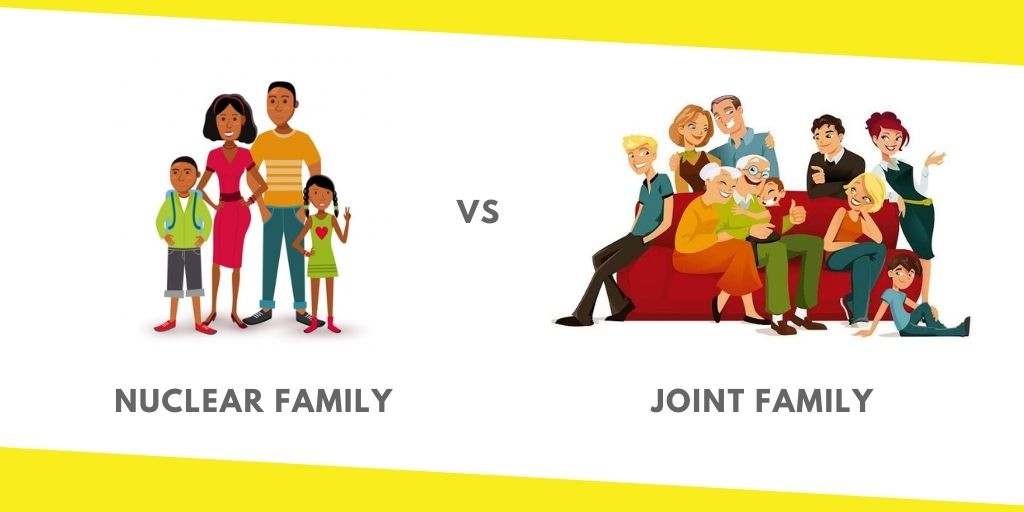Advantages And Disadvantages of Living In A Joint Family
This post was last updated on January 8th, 2025
A family is a close bond of its members and relations that is shared together and where everyone has their role.
Joint families are outgrowths of nuclear families where grandparents, parents, children, aunts, and uncles reside under a single roof for generations. Children who rear up in an extended family or a joint family develop close bonds with different family members apart from parents and siblings. Perhaps that is the reason joint family system is still flourishing, despite the increasing urbanization and trend of nuclear family.

Advantages Of Existing In A Joint Family
A joint family includes more people than a nuclear family, and so, the benefits are enhanced. These are some benefits you can reap by belonging to a joint family.
1. Shared Chores
A family resembles a big team, an association where all play their part. You don’t need to do all by yourself. Household chores, like washing, cleaning, cooking, or purchasing groceries, will be exchanged by family members, thereby reducing the burden on one person.
By being brought up together in a joint family, kids understand the division of labor and work collectively to accomplish a common goal. In the long run, functioning together as a crew will aid children master social skills and study teamwork, a vital aspect of their comprehensive personality development.
2. Sharing Becomes A Habit
A joint family teaches one to accommodate others and exchange what they possess. People do things collectively in a joint family. They distribute the expenses, household gadgets, groceries, and furnishings with the remainder of the family. Kids are inspired to exchange whatever they receive with their siblings and also cousins. The idea of ‘sharing is caring’ becomes the standard in a joint family, rendering each individual less self-oriented and more bountiful.
3. Lower Financial Stress
Among the ground rules of a joint family system is that members should distribute the financial expenses evenly. Each earning member delivers to the family’s bigger goals, like house maintenance, rents, grocery spending, water bills, and monthly power and all this relieves a single individual from bearing the overall burden. Every member attempts their best to offer everything they can financially for their family members.
4. Creates A Powerful Bond
A nuclear family involves meeting occasionally your grandparents, cousins, or even siblings and parents with whom you exchange a powerful bond. One of the main advantages of residing in a joint family is that you are able to spend plenty of time together, thereby cementing the relationships between all members. A joint family system builds a powerful bond of unity at an early age.
5. Family Values
For a joint family, the value system forms the core. Elders pursue specific principles, and children may normally inherit the value system. Children learn the lessons of morality and ethics under the tutelage of the elders. If something happens contrary to the family values, the elders rectify it instantly, assuring that the family’s values do not get compromised.
6. Strong Support System
For many, home is not simply a place; it means an emotion. It’s their comfort area, their go-to destination at the culmination of a day. A joint family home is packed with people who like and support you, offering you the strength for your entire endeavours. A home with affectionate uncles, aunts, and grandparents can be relaxing and helpful when coping with an emotional or financial crisis.
7. Better Social Skills
No two people are identical, even though they are members of the same family. You will discover members with separate personalities, dislikes, likes, and temperaments in a joint family. You cannot manage each member of the family in a like manner. You modify yourself to interact or work collectively with every individual as per their style. This also offers you a rare perspective towards life and people, thus bettering your social skills that are vital when you have to manage others outside your home.
8. Practical Lessons
The family elders can be the storehouse of knowledge and wisdom. By living in a joint family, the insight you receive from the elders is something that you may not even see in self-help books. Grandparents with a sound sense of judgment, experience, and knowledge can direct you in taking the right course in your life.
9. Quality Time With The family
The Covid-19 pandemic has instructed us to value family, life, and health. Mother Nature shoved us back to where we belong – our home and our family. More people could assign quality time with their families, as they returned to their hometowns on account of the lockdown. Children couldn’t attend school, though they learned plenty from their parents.
Learning advances in a joint family as children are able to spend quality time with their parents and their grandparents, aunts, uncles, and cousins. Joint families offer you good times and build memories for all times, with or without the pandemic.
10. Love And Bonding
When you’re residing in a joint family, your children are seldom alone, which implies you don’t have to bank on babysitters to attend to them while you commute to work. They are forever in safe hands and will be tended to with love and affection.
Disadvantages of Living In A Joint Family
The joint family system arrives with specific disadvantages also. The following are a few downsides of residing in a joint family.
1. Lack Of Privacy
Privacy could be the greatest causality in a joint family. A newlywed couple may not receive sufficient space and time to talk, due to the numerous people surrounding them. People who relish their independence may feel fearful residing with so many new people.
A personal matter could become the whole family’s business, and there could be multiple interventions or interference than one may wish. Younger family members may not get to see what they desire on TV, with the aged ones constantly around. You might omit sharing the same seat to binge watch TV shows in your weekends; you might not get to cook collectively and eat alone.
2. Individual Preferences May Occupy A Back Seat
You may desire to decorate the home according to your taste. You may yearn for new furniture or home gadgets, though you may not possess the freedom to obtain what you desire or deck the house according to your wish. Even a plain thing like wanting to eat your specific food can become hard when you have to function as per the likes or dislikes of the remaining family members.
3. Sole Point Of Control
The head of the family is generally in charge of everything within a joint family. In this set-up, you may perceive that others are controlling your life and you are dependent on them. Living in a joint family could be hard in case you are an independent individual and prefer to do things in your way.
4. Issues With Parenting Style
Although kids learn from the knowledge and wisdom of elders, there might be some interference with your parenting style. The family members could interfere with your selection of food for the children. Plenty of advices do’s, and don’ts may come to you. This could make you seem uncomfortable if you choose to rear your children in your individual way.
5. Difference Of Views
Clash of opinions or ideas could be fairly common when you’re surrounded by different types of family members. Every person has an opinion, and it may be difficult to convince all in the family to acquiesce to it. If your idea is not given value, you may feel insulted. This could result in conflict and misconception between you and the extended family members.
6. No Preference For Personal Decisions
Personal decisions don’t find a place within a joint family. You have to consider the collective decision of the family, which can occasionally imply that you have to give up your individual choices or preferences.
7. Financial Disputes
Differences may arise concerning the earning capacity of family members as one person may earn more than the other. Consequently, the member who earns less gives less to the expenses of the family, which could result in a conflict in who prevails in these matters and ultimately, cause differences.
8. Lack Of Modern Outlook
Joint families are frequently a combination of persons with conservative and contemporary outlook. Within a joint family, it is not unpopular to view a clash between the traditional opinions of the aged versus the modern approach of the younger generation. Frequently, the aged people within the family carry the last word, and they stick to their confirmed approach, offering slight chance for the younger members to voice their viewpoint. This could be a source of annoyance in the family.
9. Not All Feel Responsible
A joint family functions on the basis of shared or collective responsibility. Unemployed members can cause pressure on expenses of the family. Some members may not contribute adequately towards the family’s bigger goals, and the earning family members could experience its pinch. The transferring of the financial burden to one or some individuals could generate some conflict and disturbance in the family.
10. Might Influence The Personality
There is slight room for independent thinking since the elders of the family attend to everything. As a consequence, individuals who observe the elders’ order remain as mute spectators and could never obtain a chance to unlock their real potential or pursue their passion.
Wrapping Up
On account of the need for greater independence and meeting their individual needs, people incline to shift out of joint families while still retaining touch with them. This has resulted in the development of nuclear families, with greater number of joint families splitting due to different factors, including migration for jobs and improved living.
The option of residing in a joint family mostly rests on how suitably you can adapt. This kind of family set up functions well for persons who can adjust to any situation and include all types of people. If you support more self-sufficiency and independence, then a nuclear family can be a better option for you.
Ultimately what matters is what you plan out for yourself and your children, its feasibility and bonding perfectly with one another.
You may like this
Recommended For You
Why Sometimes Cam Sex Is Better Than Real Sex?
Sujata Sanyal
Sujata Sanyal has been in the writing circuit for the past 7 years and has touched upon various genres like travel, health, lifestyle, a wee bit of technology, cuisine, product descriptions and a bevy of others. 1 part of her is interested in animated political discussions, 2nd part interested in studying biographies and the remainder part in love with music and socially relevant work. Too many parts?




